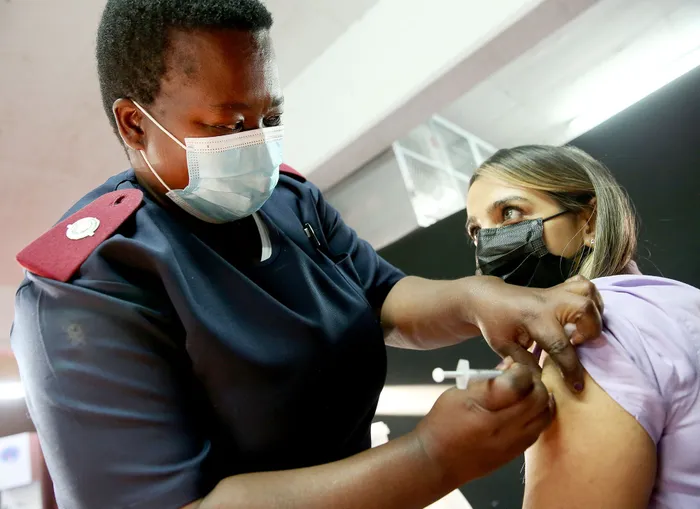Report shows how the Covid-19 pandemic caused physical and psychological damage to healthcare professionals

Registered nurse Bathobile Mpisi administers a Covid-19 vaccine to Fatima Hoosen, director of Eye Care at St Johns. Picture: Shelley Kjonstad/African News Agency (ANA)
Johannesburg - The World Health Professions Alliance (WHPA) has noted a comprehensive report from the World Health Professions Alliance (WHPA) and the World Health Organization (WHO) revealing the extent of the physical and psychological damage done to healthcare professionals during the Covid-19 pandemic because the health systems they worked in failed to protect them.
WHPA and five of its members pulled together evidence of the impact of the pandemic including the FDI World Dental Federation, the International Pharmaceutical Federation, the International Council of Nurses (ICN), World Physiotherapy, and the World Medical Association (WMA), which in total represent 41 million healthcare professionals.
WHPA said the report, titled What the Covid-19 pandemic has exposed: the findings of five global health workforce professions, showed that healthcare workers feared for their personal safety during the pandemic because of a lack of protective equipment and the absence of any systematic support and security left many feeling undervalued.
WMA president Dr Osahon Enabulele said many physicians were exhausted and demoralised after taking risks and making sacrifices during the Covid pandemic, while junior doctors were disillusioned and experiencing increased physical and mental burnout.
“It is vital we prepare now for the next pandemic. That involves strengthening health services around the world and increasing support for physicians and other health care personnel,” said Enabulele.
Chairperson of WHPA Jonathon Kruger says by pooling the data from surveys of their membership conducted during the pandemic, the WHPA organisations were able to put together a unique picture of what the pandemic looked like for health professionals on the ground.
“By identifying the challenges we have in common across the professions, we can work together to resolve them.
“The WHPA is also pleased to see the publication of this report as one of the first concrete outcomes of the Memorandum of Understanding signed between its members and the WHO in November 2022 and looks forward to continuing the collaboration,” said Kruger.
ICN chief executive Howard Catton, who is a co-author of the report, said globally, before underinvestment in health systems meant that they failed the health professionals and multidisciplinary teams that are the lifeblood and essence of our healthcare services.
“We know what needs to be done; the challenge is making it happen. A vital first step would be to have more health professionals in the most senior leadership positions to counter the current disconnect between decision-makers and healthcare professionals on the front line.
“We need governments to honour the contributions of nurses and others during the pandemic, elevate them to positions where they can more directly influence healthcare policies, and make sure that they never again have to face a deadly pandemic without the care, support and protection that they deserve,” said Catton.
According to the report, vaccination information and training need to be revised to address vaccination hesitancy and rejection.
It further notes that the report highlights the lack of mental health and psychosocial support experienced by professional staff and the profound disruption that occurred to their education with the closure of education centres and the postponement or cancellation of clinical placements.
The report says concerted efforts were needed to protect healthcare workers from the chronic violence that exists in healthcare settings and that they should have a greater say in high-level planning, strategy and decision-making about the policies that they are responsible for carrying out.
The report added that there also needed to be a greater involvement of healthcare professionals in efforts to rebuild healthcare systems after the pandemic as part of a whole-society response that will contribute to global preparedness and health security.
The Star